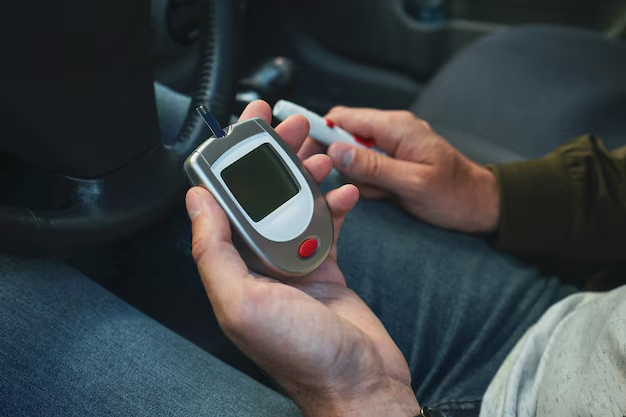Your Guide to Does Medicare Cover Diabetic Supplies
What You Get:
Free Guide
Free, helpful information about Medicare FAQ and related Does Medicare Cover Diabetic Supplies topics.
Helpful Information
Get clear and easy-to-understand details about Does Medicare Cover Diabetic Supplies topics and resources.
Personalized Offers
Answer a few optional questions to receive offers or information related to Medicare FAQ. The survey is optional and not required to access your free guide.
Medicare and Diabetic Supplies: What You Need to Know
Living with diabetes requires constant management and attention to detail, which often includes staying well-stocked on necessary supplies. For millions of Americans, Medicare is a lifeline, offering coverage for various health needs. But does Medicare cover diabetic supplies? Here's what you need to know to navigate this critical aspect of your healthcare plan.
Understanding Medicare Coverage for Diabetic Supplies
Medicare Part B is the component that covers certain diabetic supplies for beneficiaries. Specifically, Part B covers some essential items if you have diabetes and need preventive services and screenings. Here are the key supplies covered:
- Blood sugar (glucose) test strips
- Blood sugar monitors
- Lancets and lancet devices
- Insulin if used with an insulin pump
- Therapeutic shoes or inserts
These supplies are covered under the Durable Medical Equipment (DME) category if your doctor certifies that you require them to manage your condition.
Enrollment and Eligibility
To receive this coverage, it's essential to be enrolled in Medicare Part B. The supplies must be purchased from a supplier or pharmacy that participates in Medicare. Additionally, these items must be deemed medically necessary, as determined by your healthcare provider.
Financial Considerations
While Medicare Part B covers diabetic supplies, beneficiaries are generally responsible for 20% of the Medicare-approved amount after meeting the Part B deductible. This cost-sharing element is important to consider when budgeting for your healthcare expenses.
Exploring Additional Support Programs
Navigating the costs associated with managing diabetes can be daunting, especially if you're on a fixed income. Fortunately, several programs and solutions can ease the financial burden:
Government Aid Programs
- Medicaid: If you're low-income, Medicaid may cover additional costs for diabetic supplies not fully covered by Medicare.
- Low-Income Subsidy (LIS): Also known as "Extra Help," this program assists with Medicare Part D prescription drug plan costs, which can indirectly reduce your overall healthcare expenses.
Financial Assistance and Debt Relief
Numerous organizations provide financial aid specific to healthcare expenses:
- Partnership for Prescription Assistance: Offers resources for those needing help with medication costs.
- Diabetes Foundation: Provides various assistance programs for diabetes management.
Credit and Debt Solutions
Managing the cost of diabetes can feel overwhelming, especially if it leads to debt. Here are some strategies to consider:
- Medical credit cards designed for healthcare expenses.
- Credit counseling services can help create a manageable repayment plan.
Educational Opportunities
Knowledge is power, particularly when managing a chronic condition:
- Online workshops and webinars about diabetes management.
- Assistance programs that offer education on using diabetic supplies efficiently.
Additional Resources
To better manage diabetes-related expenses, consider tapping into these resources:
- 💰 Medicaid: Supplement your Medicare with federal aid for low-income individuals.
- 📊 Extra Help (LIS): Reduce prescription drug costs through Medicare Part D.
- 🏥 Patient assistance programs: Explore options through hospitals and non-profits for financial relief.
- 📚 Educational grants and workshops: Engage in programs that enhance your understanding of diabetes care.
- 💳 Medical credit options: Use credit cards tailored for healthcare expenses to spread out payments.
Managing diabetes efficiently often involves piecing together multiple resources to cover all bases. Ensure you're leveraging Medicare as well as other available aid programs to maintain your health without undue financial stress. Always consult with your healthcare provider or a Medicare representative to verify eligibility and discover more personalized assistance options.

Discover More
- a Medical Provider That Accepts Medicare Assignment Must
- a Medical Provider That Accepts Medicare Assignment Must Quizlet
- a Medicare Patient Received Treatment That Isn't Covered By Medicare
- a Medicare Patient Receives Treatment That Isn't Covered By Medicare
- a Medicare Supplement Basic Benefit Is Quizlet
- a Medicare Supplement Companies
- a Medicare Supplement Policy Is Quizlet
- a Medicare Supplement Policy Must Not Contain Benefits Which
